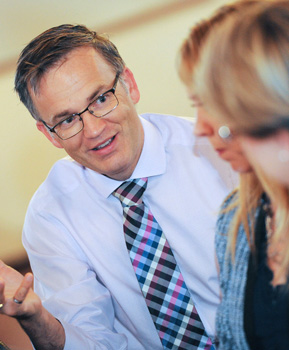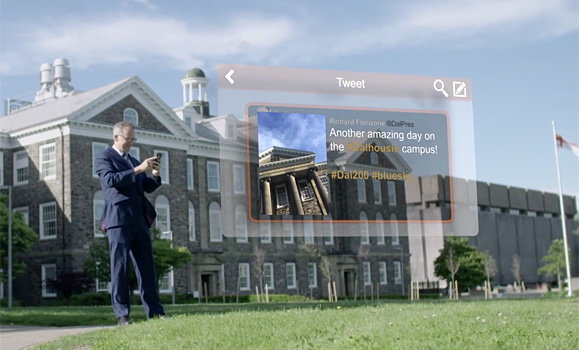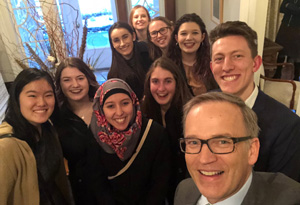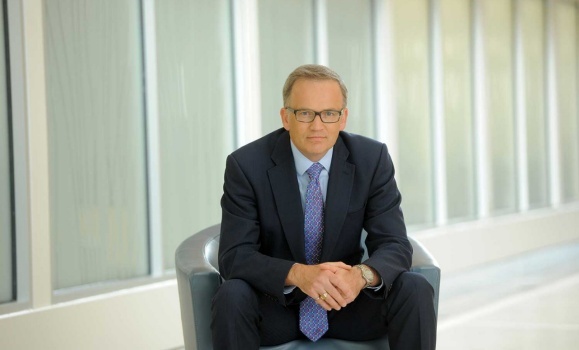President Richard Florizone joined the Dal community as its 11th president and vice-chancellor in 2013. It‚Äôs been an eventful five-and-a-half years for the university: big awards, major research announcements, national profile and growing international reach ‚Äî¬Ýall culminating in celebrations to mark Dal‚Äôs 200th anniversary.Ã˝Ã˝Ã˝Ã˝Ã˝Ã˝Ã˝Ã˝Ã˝Ã˝Ã˝Ã˝Ã˝Ã˝Ã˝Ã˝Ã˝Ã˝Ã˝Ã˝Ã˝Ã˝Ã˝Ã˝Ã˝Ã˝Ã˝Ã˝Ã˝Ã˝Ã˝Ã˝Ã˝Ã˝Ã˝Ã˝Ã˝Ã˝Ã˝Ã˝Ã˝Ã˝Ã˝Ã˝Ã˝Ã˝Ã˝Ã˝Ã˝Ã˝Ã˝Ã˝Ã˝Ã˝Ã˝Ã˝Ã˝Ã˝Ã˝Ã˝Ã˝Ã˝Ã˝Ã˝Ã˝Ã˝
With Dr. Florizone set to leave Dal at year’s end to take on a new role leading the Quantum Valley Ideas Lab in Waterloo, Ont., he sat down for an in-depth chat with Dal News on his time as president. In part one, we discuss first impressions and Dr. Florizone’s 100 Days of Listening project, as well as some of his core priorities and accomplishments as president. (Link to part two.)
Becoming president…
Not everyone who serves as a university president has as extensive a background outside the academy as you have. Given your varied experiences, what did you find that’s unique about being “university president”?
My immediate reaction is that it‚Äôs not so much being a university president that‚Äôs unique ‚Äî it‚Äôs being president of –¬∞ƒ√≈¡˘∫œ≤ ø™Ω± that‚Äôs a singular experience. Canada is a great country, and –¬∞ƒ√≈¡˘∫œ≤ ø™Ω± is the leading research university for four of the great provinces in Canada. And in an age of knowledge, those research universities are more important than ever.
For one, they are responsible for educating professionals to serve this region ‚Äî everything from physicians and lawyers to poets and journalists. That‚Äôs a crucial role in terms of serving society. But it‚Äôs also that our society and our economy, more and more, is driven by knowledge, and that the biggest opportunities and challenges we face are too big for any one discipline, sector or institution to tackle alone. Society is relying on universities for that new knowledge, new interpretation, new invention and new partnership to address some of our biggest problems. So being –¬∞ƒ√≈¡˘∫œ≤ ø™Ω±‚Äôs president is a singular role at a singular institution.
You arrived at –¬∞ƒ√≈¡˘∫œ≤ ø™Ω± in 2013 with an initiative you called the . It ended up being the start of a robust institutional planning process ‚Äî but it also gave you a speedy introduction to this university and its people. What did you learn about –¬∞ƒ√≈¡˘∫œ≤ ø™Ω±, and being its president, from those 100 Days?
First off, I’d say the 100 Days experience ended up being even more valuable than I thought at the time. It came out of my own experience and background: my belief that strategy is both a top-down and bottom-up affair. It’s bottom-up in that you need not only the facts and the data, but the hopes, dreams, aspirations of an institution’s people. Then the top-down piece is, how do you actually take that and craft a coherent narrative or strategy that’s going to work? And, of course, being a collegial institution, the next step is getting Senate and Board approval on that direction, providing you with a mandate that is critically important in terms of galvanizing and organizing a path forward.
 In terms of what I learned about –¬∞ƒ√≈¡˘∫œ≤ ø™Ω±, it was a lot of things that have shown up in our work over the past five-and-a-half years: the four ‚ÄúRs,‚Äù as I‚Äôve called them, of ‚Äúretention, research, returns to society and respect‚Äù; our priority research areas; and this interesting aspect of our history, this founding vision of being open to all, regardless of class or religious belief. Although I knew that was a vision grounded in the 19th century and those realities and biases of the time, it resonated with me. Sometimes the best kind of directions for an institution are grounded not just in the facts and data and aspirations of its people, but in history, ideas that represent a logical evolution of the institution. So when you can find threads in an institution‚Äôs history you can revisit, like a living tree, that‚Äôs where you have real power and resonance to find positive ways forward. (Pictured: President Florizone during the 100 Days of Listening.)
In terms of what I learned about –¬∞ƒ√≈¡˘∫œ≤ ø™Ω±, it was a lot of things that have shown up in our work over the past five-and-a-half years: the four ‚ÄúRs,‚Äù as I‚Äôve called them, of ‚Äúretention, research, returns to society and respect‚Äù; our priority research areas; and this interesting aspect of our history, this founding vision of being open to all, regardless of class or religious belief. Although I knew that was a vision grounded in the 19th century and those realities and biases of the time, it resonated with me. Sometimes the best kind of directions for an institution are grounded not just in the facts and data and aspirations of its people, but in history, ideas that represent a logical evolution of the institution. So when you can find threads in an institution‚Äôs history you can revisit, like a living tree, that‚Äôs where you have real power and resonance to find positive ways forward. (Pictured: President Florizone during the 100 Days of Listening.)
What’s something that people who haven’t been a university president might not appreciate about the role? Or something that might surprise them?
What’s great about the role — and challenging, too — is that involves everything from literally what’s happening in the dining hall to dealing with heads of state. Even when you’re a vice-president, you don’t really have the full sense of what it entails. Because of that, it can seem a bit mysterious to people, which is the principal reason : if I can give people a glimpse of what I’m dealing with in the institution, or what I’m up to as president, it might help them feel more engaged and bring a bit more transparency to the role.
It’s been great to meet people in person and, because they followed me on Twitter or maybe we’d had an exchange on there, it was like I was meeting them for the second or third time rather than the first. It meant those first conversations were deeper and richer, a little more informal. That’s one of the real positives: it’s a facilitator. The downside, of course, is that it’s always on — which is true of other elements of the job as well. It’s another channel that can make it harder to turn off at night when you need to.

President Florizone tweets in a still from the Dal 200 promotional video.
The challenge for leaders is finding that balance between openness and engagement, which is critical, and that time when you can stop, digest, plan and strategize — or even to stop and breathe. I often say the bedrock of any leadership position in anyone’s career is to remember food, sleep and exercise. You have to carve out that time not just to be thoughtful and reflective, but to support yourself as a human being.
Priorities and progress…
As you noted, you’ve often framed your priorities as being “the four ‘Rs’”: retention, research, returns to society, and respect. “Retention” is priority one in Dal’s Strategic Direction, too — why has it been such a key focus for you?
I‚Äôm really passionate about the mission of universities: teaching and learning, research, and service. And of those, first and foremost we‚Äôre an educational institution. To put it really simply, the most important part of the student experience at –¬∞ƒ√≈¡˘∫œ≤ ø™Ω± is getting a degree. Now, there‚Äôs a lot of caveats I can add to that, of course, and I don‚Äôt want to minimize all the other aspects of education that are so vital. But it‚Äôs true that when students come here, and when their parents and family often support them to come here, it‚Äôs because they want to get a degree.
So, for me, when I looked at the data, and I saw –¬∞ƒ√≈¡˘∫œ≤ ø™Ω± students weren‚Äôt performing as well in continuing in their studies from first to second year as others in the U15 [group of Canada‚Äôs research universities], it was a concern, but one that we could mobilize people around solving: it‚Äôs so fundamental to our mission and our values. Students and their families are investing their hopes, dreams and aspirations with us ‚Äîare we supporting them in the way they‚Äôre being supported at other institutions? And do we actually know what the barriers are and how to address them?
We’ve been able to make progress on retention, and we’ve done so with initiatives like On Track that have not only been successful, but have really resonated with donors. We’ve been able to go to graduates and alumni and say, “help our student be as successful as you were.” It’s an inspiring message.
How do you think the student learning experience at –¬∞ƒ√≈¡˘∫œ≤ ø™Ω± is changing? I‚Äôm thinking, in particular, about the rising emphasis on co-op, work-integrated and experiential learning ‚Äî it seems to be a major theme in higher education more generally, and something coming up more and more on campus.
It’s coming up across the country, actually, working with Universities Canada and with lots of Canada’s CEOs from the higher ed roundtable.
 Here’s why: the future of work and learning is uncertain, and I want to be really clear on that. Anyone who thinks they know what the future holds, what skills are needed, is a little bit wrong. You only have to look back in history to see how education, or the workforce, has changed in ways people couldn’t have predicted. But if you look amidst that uncertainty, there’s a great argument to be made that, with the rise of machines, it’s the skills that make us most human that will be most valuable. That’s not to say the technical skills aren’t important: I’m an engineer, a scientist myself. But it will absolutely be a blend of human and technical skills. (Pictured: President Florizone takes a selfie with Loran Scholar students.)
Here’s why: the future of work and learning is uncertain, and I want to be really clear on that. Anyone who thinks they know what the future holds, what skills are needed, is a little bit wrong. You only have to look back in history to see how education, or the workforce, has changed in ways people couldn’t have predicted. But if you look amidst that uncertainty, there’s a great argument to be made that, with the rise of machines, it’s the skills that make us most human that will be most valuable. That’s not to say the technical skills aren’t important: I’m an engineer, a scientist myself. But it will absolutely be a blend of human and technical skills. (Pictured: President Florizone takes a selfie with Loran Scholar students.)
Experiential learning seems like a perfect way to deal with that uncertainty. Students get to go out and apply their knowledge, and experience a future profession. It’s a testing ground for them. It’s a huge benefit to employers, too. Even if we have to push them, sometimes, to make these positions for students, they know in the long term that it’s one of the most effective ways to trial employees and bring them into their organizations. It’s a real win-win.
But the other thing, which has been talked about much less, is how it’s a feedback loop between the employment system and the education system. Everyone’s talking about how universities should reshape themselves for the future. That’s a good debate, and it should happen. But to come back to my first point: nobody really knows what the future holds. So, what do you need to do? You need to build more feedback loops. Think of a system change instead of trying to predict a certain scenario. If you build that feedback loop, if students go out and do a practicum, it shapes the kind of questions they ask in the classroom, which in turn shapes the professor’s approach and the curriculum. It’s a living dialogue. By having students have that practical experience, you’re creating a feedback loop which helps make the education system richer and strengthens the university.
One of Dal’s biggest achievements during your time as president has been the — launching a $220-million global ocean research initiative with the largest federal funding grant in the university’s history. What can Dal learn from that success as it works to advance research and innovation into its third century?
Ã˝Ã˝
By definition, we’re Atlantic Canada’s research university, and that means we must have a strong, robust agenda for research and schol

